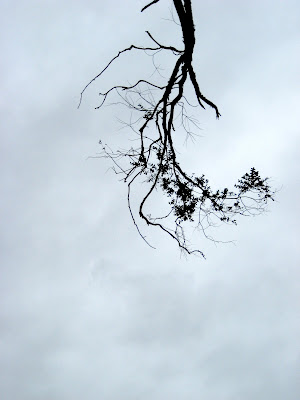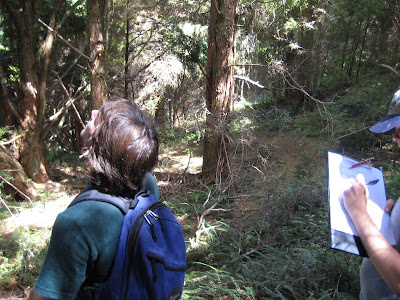
To DCIAfter our travels with Andy Waterman we said our goodbyes and hitchhiked back to Auckland. I found my feet toeing off dirty hiking shoes at the doors of the Dorje Chang Institute, a community residence center and Tibetan Buddhist Monastery of two monks and two nuns. They hold daily classes, Pujas and discussions that are open to everyone (
DCI).
There was definitely a peace to the place. I noticed immediately that everyone spoke with a calmness that would seem foreign to any American. Delicate attention was given to everything said and the self-conscious seemed simply absent from their actions. I envisioned a cartoon with a bubble coming out of my head containing the word "Stress?" The next frame, a close up of one of the monks or nuns faces, completely bewildered and confused.
Most of the work I did to earn my accommodation was domestic and at my own scheduling. You might think it cliche for a monks prescription, recalling the infamous Karate Kid's "Wax on...Wax off" scene... I scrubbed floors repeatedly, tidied already clean surfaces, painted in bright colors and tended to the garden, all of which encouraged me to think and reflect for long periods of time in silence. It was "menial" work, as my mother calls it, but I really enjoyed the personal time. It was nearly meditation. The greatest challenge came in trying to clean cobwebs in outside areas without harming life. In practicing the Bodhidharma, even the smallest ant or spider must be peacefully relocated, spared with compassion. Buddhists believe that sentient beings are reincarnated to build more positive karma towards their own enlightenment. Life, in any form, is sacred and should be respected. Keeping in mind that a worm could have been a relative in a past life, Buddhists practice "everything is our mother" in an effort towards
Bodhichitta, on the path to enlightenment.

New Years/50th Anniversary of Chinese Occupation
Our arrival at DCI was a week or two prior to the Tibetan New Years celebration. This particular year, New Years was not celebrated.
In observation of the fallen Tibetans that have resisted Chinese force, Tibetans around the world were asked by His Holiness the 14 Dalai Lama to observe the otherwise passionately celebrated holiday in silence and peaceful protest. Chinese authorities forced Tibetans still in Tibet to celebrate so as not to cause a disruption.
There's an article about it here:
http://www.boingboing.net/2009/02/25/tibetan-new-year-pro.htmlI was first introduced to the issue when I saw the film
Seven Years in Tibet a few years ago. Brad Pitt acts out the real life story of Heinrich Harrer, an Austrian mountain climber that stumbles upon Lhasa and befriends the child Dalai Lama during the beginning of the Chinese takeover. When I found out that the story was true, I did a little research into the issue and began to feel sorry for Tibetans, questioning the legitimacy of Chinese imperial intentions. Unfortunately, it wasn't long before the issue had slipped from my mind. Matters of import such as this are often forgotten about when headlines in the American Media focus on real issues like: "Russel Crowe throws telephone," "Robert Redford buys Red Ford..." "Brittany Spears Arrested," "Hugo Chavez Loves Crackers."

In 2007, I traveled to China with a political science group from my University conscious of the conflict, but hopeless as an actor as we toured three and a half million square miles in four weeks. The issue was then permanently placed in my conscious, but put on a backburner until just recently. When March 10th came around pretty quickly, I found myself finally more involved.

It was a beautiful, clear and sunny day with the wind picking up off the piers of Auckland. There was just enough gust for a good game of Ultimate Frisbee but not quite enough to fly in a glider. I let it push me towards the square downtown where a sea of Tibetan flags flapped through its breeze. Fifty headbands were being handed out, one for each year since the oppression began. I found myself ironically wrapping my birth-year around my head, ruminating on the fact that every year since has been no different for Tibetan freedom.
Monks prayed peacefully, dedicating their actions for the benefit of all sentient beings. Among them were my new found friends and teachers: Venerable Gyalten Wangmo, Rinchin Dhondup, Geshe Wangchen and Venerable Lobsang Konchog (Pictured above with me). We marched the streets together, bound by a white cloth banner in simple black paint that read, "
Tibet: 50 years under Chinese Oppression." Nobody shouted or yelled negatively. This was a different kind of protest. People walked by seemingly baffled by the lack of aggression, likely expecting thrusting fists and angry shouting. It's possible that we made a more profound statement in our approach.

After the march, we gathered at a memorial erected for those who have fallen. A rainbow rose behind an array of Tibetan national flags as the monks and participants observed silence for those killed as a result of this event, Tibetan and Chinese alike. News and an update from the Dalai Lama himself was read aloud.
 An Introduction to Buddhist Philosophy
An Introduction to Buddhist PhilosophyBuddhist ideas I strongly agree with or respond to:
The Buddha is not some type of super-man or extraterrestrial alien that just appeared on this earth endowed with super-human qualities. -Chokyi Dragpa
In Buddhist thought, we all possess the same potential the Buddha did before he reached enlightenment. Faith only need be applied in the self and the mind, not in the supernatural. In developing
ourselves and practicing compassion and wisdom, we can create a better life and world. Buddhism conflicts with Christianity here. The Christian tradition advocates service to others, especially for the oppressed, as Jesus Christ did in his time. This is usually manifested in group actions or other collective Christian missions/endeavors. Without regard to preliminary work on the self you are expected as a Christian to be of service to the less fortunate without question. In Buddhism, the work must first come from within. You aren't fully capable of really helping others until you've at least begun to understand yourself. In fact by doing so, and if everyone did so, the collective is enriched and healed from the bottom up. Your acts of compassion then have more meaningful potential and application. You answer the "why" before you ask it. In Buddhist thought, we can alleviate suffering by individually becoming free of the things that create it: Attachment, anger, jealousy, etc.

What I enjoyed most about the Buddhist teachers I encountered was their sense of ease and peace. In a recording of a discussion, Venerable Rene Feusi lectured to a gathering of pupils and said, "Life is FUNNY! We act too serious!" He points out that we are goofy "animals playing awkward roles," especially in the west (he is western). He taught, "Awkward situations are
funny, not awkward! Laugh at them, stop being so conscious of your social self." He's hinting at the understanding of emptiness, the potential we all possess to acquire a mind clear of dissatisfaction.
We all have the ability to live more purely and promote satisfaction universally. Unfortunately, we succumb to habits and desires that blur our sense of natural, potential purity. But it's never too late to realize that the mind is fundamentally pure with some deep work and self-realization, the purpose of meditation. One of the best analogies I heard regarding the potential to acquire a clear mind was later stated by Feusi when he said, "Clouds in the sky don't affect the naturally pure state of the sky." The sky is always purely there. The nature of space itself is awareness. The enlightenment qualities are always there within us and we always have the potential to develop and exercise them.




 Born in the year 1988 to the royal Toyota Hiace family, Gertrude was destined for a life of hard work and exploration. At the ripe old age of 21 (92 1/2 in car-years), Gert has a delicate, steady momentum, a strong perseverance... and awful smelling gas. Her eyes are the most beautiful shade of yellow and she keeps a constant crooked smile. Her voice cracks, she's deaf, and never showers. She's perfect.
Born in the year 1988 to the royal Toyota Hiace family, Gertrude was destined for a life of hard work and exploration. At the ripe old age of 21 (92 1/2 in car-years), Gert has a delicate, steady momentum, a strong perseverance... and awful smelling gas. Her eyes are the most beautiful shade of yellow and she keeps a constant crooked smile. Her voice cracks, she's deaf, and never showers. She's perfect.




 After the march, we gathered at a memorial erected for those who have fallen. A rainbow rose behind an array of Tibetan national flags as the monks and participants observed silence for those killed as a result of this event, Tibetan and Chinese alike. News and an update from the Dalai Lama himself was read aloud.
After the march, we gathered at a memorial erected for those who have fallen. A rainbow rose behind an array of Tibetan national flags as the monks and participants observed silence for those killed as a result of this event, Tibetan and Chinese alike. News and an update from the Dalai Lama himself was read aloud.



 More soon...
More soon...









 Magic.
Magic.







